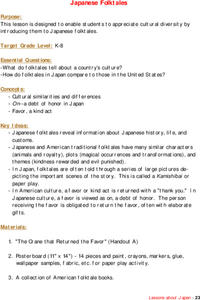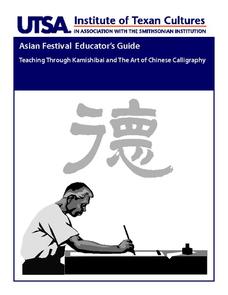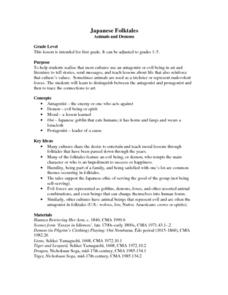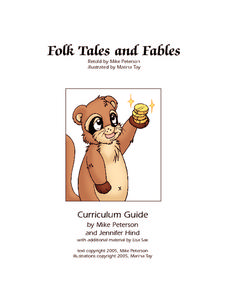Cleveland Museum of Art
Japanese Folktales (Asian Odyssey)
The Cleveland Museum of Art presents this interdisciplinary model unit that asks class members to explore how the same themes are presented in the folktales and art of several cultures.
Curated OER
Japanese Folktales
Students read both Japanese and American folktales and respond to teacher generated questions. They compare the folktales and determine if there is a lesson to be learned. They draw story card to retell the story to the class.
Curated OER
Japanese Folktales
Young scholars identify that Japanese folktales reveal information about Japanese history, life, and customs. Students identify and interpret the work kamishibai, paper play and explain that in Japanese folktales are told through a...
UTSA Institute of Texas Cultures
Teaching Through Kamishibai and The Art of Chinese Calligraphy
Young learners discover kamishibai, a popular Japanese storytelling art, and explore how these Japanese folktales illustrate the country's cultural themes and values through discussion and storyboarding.
Curated OER
Japanese Folktales
Students listen to examples of Japanese folktales and identify universal themes. Students construct a 'kamishibai' - a traditional Japanese storytelling prop - and dramatize a folktale through puppetry.
Curated OER
Integrating Japanese Folk Tales into the Classroom Using Japanese Kamishibai
Young scholars study Japanese folk tales focusing on the traditional values and key elements. They compare the Japanese values with their own. They discuss Japanese art before designing a set of kamishibai on which they write a summary...
Curated OER
Shizuko’s Daughter: Story Impression
Craft your own fairy tale based on Momotaro, a Japanese story referenced in Kyoko Mori's Shuzuko's Daughter. A list of nouns guide learners in writing their own story, and predicting what might happen in the novel.
Curated OER
Developing Writing Skills Through Japanese Folk Music
Students listen to Japanese folk songs to get inspired to create a writing piece about Japan. In this writing lesson plan, students use primary and secondary sources to add information about Japan.
Curated OER
Japanese Folktales: Animals and Demons
Learners compare and contrast the stories from different cultures by studying the folktales of Japan and their use of animals and antagonist characters. Any activity in this lesson can be used as a separate lesson.
Curated OER
Haiku and Beyond: Exploring Genres of Japanese Literature
Fourth graders compare and contrast the literature of Japan as they study the culture, history and geography of the island nation. They read various genres of literature, describe geographic and landform features of Japan, and find...
Curated OER
Kodomo No Hi: Children's Day Celebration
Children's Day is a beloved Japanese holiday with many colorful and engaging traditions. On this national holiday celebrated yearly on May 5, children are honored for their strengths and given good wishes for happiness. Your younger...
Weekly Story Book
Folk Tales and Fables
Pages and pages of engaging activities, worksheets, and writing projects on teaching folktales and fables await you! You don't want to miss this incredible resource that not only includes a wide range of topics and graphic organizers,...
Curated OER
Being in the Noh: An Introduction to Japanese Noh Plays
Students analyze the conventions used in Noh plays and write an introduction to a Noh play of their own. In this Noh play lesson, students identify the conventions of the Noh form and analyze the realizations the main character achieves....
Curated OER
Good Prevails
Students write descriptive paragraphs of characters after reading a Japanese folktale in which characters represent by good and evil.
Curated OER
Japanese Folktales for Children
Students study Japanese folkart traditions and culture through storytelling, class discussions, and a creative project. The project involves students creating drawings of a pre-selected folktale and putting them together in a class book.
Curated OER
Rice is Nice
First graders explore Japanese foods through fairy tales, fiction and nonfiction books, cooking meals and eating with chopsticks. After all of the creative ideas have been utilized, the class holds a tea party for parents in the classroom.
Curated OER
Writing Japanese Stories (Grades 6-8)
Learners listen to several Japanese stories and write their own Japanese-style stories, which they share with the class.
Curated OER
Folktales (African American, Chinese, Japanese and Korean)
Students participate in a variety of activities that are concerned with comparing different cultures through the literary genre of folktales. The stories are used to stimulate student interest and provide a context for how a society...
Curated OER
Your Story, My Story
Middle schoolers write from differing points of view, and act out stories in pantomime as another student narrates.
Curated OER
Where Am I?
Second graders listen to a Japanese folk tale called "The Traveling Frogs". They role play the story using puppets or costumes. They locate Japan on a map and discuss several geography topics. They independently write about ways they...
Curated OER
Land of the Rising Sun
Students survey aspects of traditional and modern Japanese customs and beliefs in the seven lessons of this unit. Both the culture and the geography of the country are studied in this unit.
Curated OER
Storytelling: Using the arts to enrich the curriculum
Students examine storytelling in a cross curricular unit. Language arts, social studies, science and math are all incorporated in this project as well as technology through the use of Hyperstudio.
Curated OER
Word Play
Students examine the Japanese folktale, Monkeys Grasp for the Moon. In this multicultural literature instructional activity, students discuss the theme of the folktale. Students choose animal folktales from other Asian cultures for...
Curated OER
Japanese Warriors
Students compare and contrast the warriors in Japanese history, folktales, and art to the kinds of soldiers American children learn about. This lesson includes possible lesson enrichments.

























